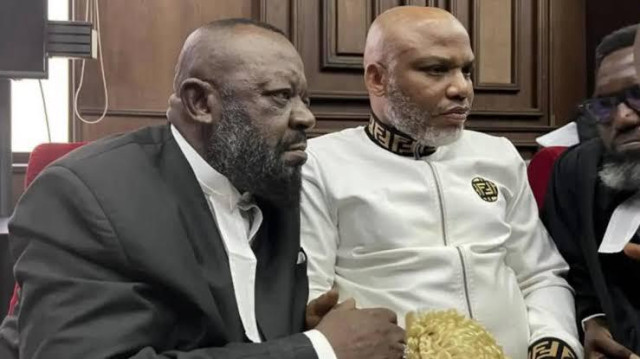The Department of State Services (DSS) clarified on Wednesday that it is not involved in the controversial arrest of Nnamdi Kanu, the leader of the outlawed Indigenous People of Biafra (IPOB), in Kenya, emphasizing that its operations are confined to Nigeria’s borders.
This information surfaced during the cross-examination of a prosecution witness, an intelligence officer from the DSS known as BBB. Kanu faces terrorism-related charges from the Federal Government.
During the cross-examination, defense counsel Paul Erokoro (SAN) distanced the defense team from a series of controversial media reports linked to them, stating, “We are not part of those negative reports.”
Lead prosecuting counsel Chief Adegboyega Awomolo (SAN) supported this, expressing concerns about the negative impact of such narratives, and revealed he had formally communicated with the defense on the matter, requesting the court to issue a directive to address the issue.
He emphasized the need for caution, particularly among legal professionals, given the sensitivity of the case.
Justice Omotoso cautioned lawyers against sensationalism and unethical conduct, stating, “Attorneys must not leak court proceedings or confidential information for attention or sympathy.”
He stressed the importance of prioritizing justice over personal gain and warned against exploiting parties' situations to generate social media traffic.
During the cross-examination, Erokoro questioned the DSS officer on various aspects of the agency’s investigations and operational boundaries.
The officer, who admitted he had not listened to Radio Biafra directly, stated that the intelligence regarding Kanu was deemed credible based on reports from other personnel. When queried about the legality of Kanu’s arrest in Kenya, the officer insisted on their lack of involvement, stating, “We are a domestic intelligence agency.
We do not operate outside Nigeria. If he was arrested in Kenya, we are not accountable.” Regarding Kanu’s allegation of being “kidnapped” and forcibly returned to Nigeria, the witness responded that it was not within his brief to investigate.
The defense also cited various judicial decisions declaring Kanu’s detention and the invasion of his home in Abia as illegal.
Erokoro successfully submitted authenticated copies of court judgments from Abia, Umuahia, and Enugu, without objection from the prosecution, which were admitted by the court.
Erokoro additionally questioned whether advocating for self-determination without violence qualifies as terrorism. The witness agreed that “not all agitators are terrorists,” but maintained that Kanu's actions were promoting violence.
The defense raised concerns about perceived inconsistencies in how other regional security groups, like Amotekun, were treated compared to IPOB, questioning whether those groups were subjected to the same level of scrutiny.
On the general issue of insecurity, the DSS officer acknowledged that even with Kanu in custody, violent incidents associated with IPOB persisted, albeit at a decreasing rate.
Tensions escalated between both sides when the defense requested to pause the proceedings to obtain specific video evidence.
Awomolo objected, accusing the defense of employing delaying tactics. However, Justice Omotoso approved the request “in the interest of justice” and scheduled May 22 for the continuation and conclusion of cross-examination, cautioning the defense to conclude its case or risk it being closed.




















